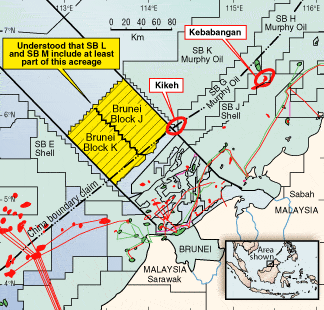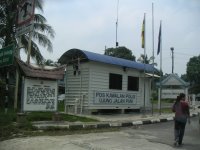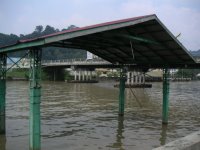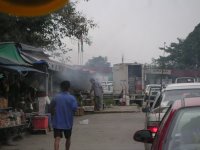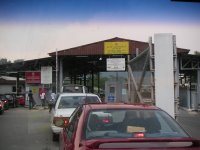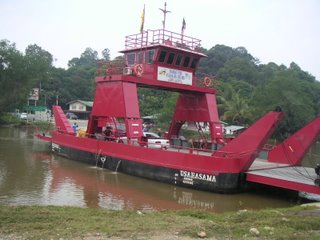Hmm... no wonder Malaysia want to bulldoze Brunei on her sovereign rights over her South China Sea territorial boundary, the land dispute in Limbang as well as the Spratly Islands... -------------------------------
Dwindling oil reserves weigh on Malaysian growth
By John Burton in Singapore Published: August 7 2006 12:06 The recent decision by Petronas, the Malaysian state energy group, to take a stake in Rosneft, the Russian oil producer, underscores worries about Malaysia's dwindling oil reserves.The $1.1bn deal to gain access to Russia's oil fields comes as Petronas recently reported that domestic oil production last year fell by nearly 5 per cent to 700,000 barrels a day. Malaysia's is south-east Asia's largest oil producer after Indonesia.
Petronas blamed the decline on shutdowns for “major maintenance and repair works in several fields” operated by joint venture partners, which include ExxonMobil and Royal Dutch/Shell. But it expressed confidence that proved and probable crude oil reserves of 5.25bn barrels meant that Malaysia still had 20 years of oil reserves at current rates of production.Independent analysts estimate that Malaysia has about 14 years of oil production left, if only proven reserves of 4.2bn barrels are taken into account.
“Mature fields are declining faster than new fields coming on stream,” said a London-based energy analyst with an international bank. “They are definitely not replacing reserves with new discoveries too well. In 1995, the [proven] reserve figure was 5.2bn barrels.”The decline in Malaysian oil production could affect future economic growth since oil represents about 9 per cent of Malaysian exports. The oil industry accounts for about 30 per cent of government revenues when the country is struggling to cut a large budget deficit.Najib Razak, the deputy prime minister, warned last year that Malaysia could become a net oil importer by 2009 if it did not find new oil reserves and domestic demand continued to surge. “This means we cannot continue to lean on the oil sector,” he said.Declining oil production in Malaysia and neighbouring Indonesia and Brunei means that east Asia will rely more on the Middle East, Russia and Africa for future supplies. Indonesia's proven oil reserves of 4.4bn barrels are only slightly larger those of Malaysia.Malaysia's main overseas oil markets include Japan, South Korea, Thailand and Singapore, while it is expanding exports to the US, Australia, New Zealand and Chile. Hassan Marican, Petronas chief executive, said the group spent M$12bn last year to make new discoveries for oil and gas.Although higher oil prices mean that Petronas and its partners have more money to spend on oil exploration, inflation in the oil service sector is also rising rapidly.“Costs to find, develop and produce oil and gas has increased by an average of 50 per cent over the last two years,” Mr Hassan recently told an energy conference in Kuala Lumpur.“The increase in capital expenditures and shortage in capacity in contracting services may result in the deferment and delay of some projects.”In addition, most of the new oil fields are located in deep water or ultra-deep water areas, which makes production more expensive. Most of the recent finds are off Malaysia's Sabah state on the island of Borneo.Petronas is hoping to tap the new fields, which could hold up to four times Malaysia's present reserves, if more advanced technology becomes available.
Meanwhile, Petronas has invested in overseas oil production, mainly in Egypt, Sudan and the Caspian Sea, which account for oil reserves of 2.35bn barrels. However, its international oil operations also suffered a nearly 6 per cent fall in production last year to 185,000 barrels a day.Copyright The Financial Times Limited 2006
-----------------------------
In Foreign Policy's Article, The Spratlys Islands dispute Im sure is never far from people's mind...
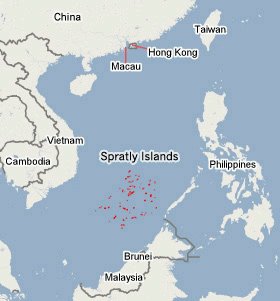
Brunei, China, Malaysia, the Philippines, Taiwan, and Vietnam
Area of dispute: The Spratly Islands, a cluster of more than 100 tiny reefs, islets, and atolls in the South China Sea, with a land area of less than 5 square miles.
Why it matters: Food, traffic, and oil. The Spratly Islands are one of the most heavily fished areas in the world. They’re also located in the center of the principle shipping route between Europe and Asia. And most lucrative of all are the untapped energy sources from the seabed below. China estimates that there are 17.7 billion tons of oil in the area, which would make it the fourth-largest oil reserve in the world.
Current status: The reasons for sovereignty claims are myriad: Some nations insist that they have historical ownership, while others say that geographical logic should prevail. All parties laying claim to the territory with the exception of Brunei maintain a military presence on the islands, despite a 2002 commitment (signed by all but Taiwan) to resolve differences by peaceful means. Although military confrontations have calmed down in recent years, the islands remain a hot-button issue in the region.
